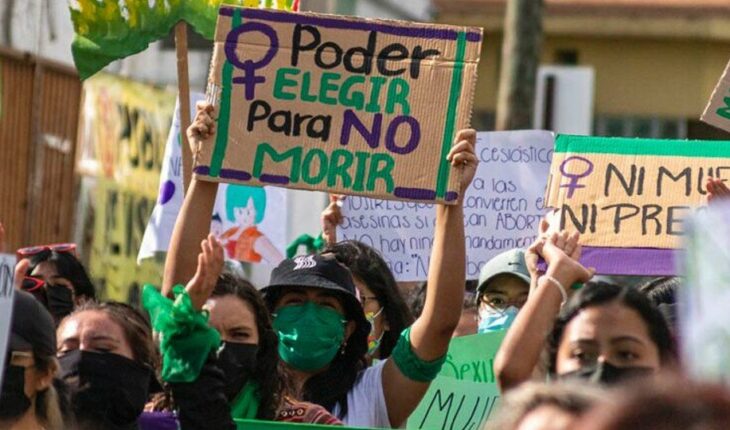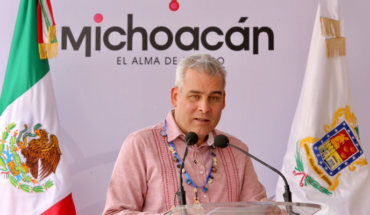A few years ago, Rosa, then a 17-year-old teenager, was a high school student when she shared with her friend the reason she was absent from school for a week: she terminated her pregnancy. A process that she lived alone, due to the fear of stigma, even with the risk of death.
The young woman, originally from a Nahua community in Chilapa, had a boyfriend and became pregnant. He left her alone in this. His parents couldn’t know; they would surely want her to get married and have the baby, or they would run her out of her house and she would have to leave school. He fled to all those possibilities of his destiny.
She approached an aunt, who accompanied her with a doctor who performed an abortion with pills.
The process of expelling the product she lived alone, in a room she rented at the head of Chilapa, where she studied. No one else knew. She was locked up for days writhing in pain.
Read: 15 years and counting: legal abortion in Mexico City
Her friend knew it until later. Rosa, as it was decided to call this teenager to keep her identity told her until she returned to school, after she recovered. Fortunately he was able to do it.
Guerrero and the context for the decriminalization of abortion
Legal prosecutions, detentions, maternal death, psychological problems, is the context of many women in Guerrero because the decriminalization of abortion, even when discussed in the local Congress after years of feminist struggle, is a pending guarantee for them.
In Guerrero there is a crucial moment in favor of women’s rights, the reform of the Criminal Code of the entity for the decriminalization of abortion is under debate among the deputies, which means the great possibility of compensating a debt of criminalization towards women who decide to terminate a pregnancy.
On Wednesday, May 4, the deputies gave the first reading of the reform initiative in the plenary session of the local Congress, after on January 12 the Moreno deputies Beatriz Mojica Morga, Gloria Citlali Calixto Jiménez and Nora Yanek Velázquez Martínez presented the legislative proposal to decriminalize abortion.
This Wednesday, they would give the second reading to proceed to the discussion and finally the vote that would lead to the reform of the Criminal Code, but it did not happen because the deputies postponed the session, because, apparently, many of them did not manage to reach the city of Chilpancingo, where the legislative headquarters is, after they went out to celebrate Mother’s Day. They rescheduled the session for the following Tuesday, May 17.
The reasons for women to decide freely about their lives and bodies are so many, and they have been repeated by activists, feminists and members of civil society organizations.
Who still does not give a clear position on the decriminalization of abortion is Governor Evelyn Salgado Pineda. She spoke out in favor of the welfare and respect for women’s rights, and condemned the forced marriages that occurred in the High Mountain of Guerrero, of which it was known last year, but nothing of the current discussion.
The search for decriminalization occurs in the midst of two declarations of Gender Violence Alert (AVG) in the state, the last for comparative grievance, which shows the need to standardize the Official Mexican Standard 046 on Family, Sexual and Anti-Women Violence to guarantee girls and women victims of rape the interruption of pregnancy without having to file a complaint and thus avoid a risk to their health.
There is another alarming indicator that could also denote the great problem that the state experiences because of an abortion, provoked or spontaneous: maternal mortality.
In this 2022 Guerrero in grew the figures of maternal mortality compared to 2021 and 2020, according to the records of the Observatory of Maternal Mortality in Mexico.
From the beginning of the year until the first week of May, which is the last record made public by the Observatory of the situation in the country, they have registered 230 cases of maternal mortality, and Guerrero ranks third in that record of cases, with 16.
Read: Mexico, the country with the most teenage pregnancies and missing women in Latin America
In 2021, during the same time range, the state recorded half of cases of maternal death, that is, eight, and a year earlier, in 2020, in the same period of time they counted only six.
According to the federal Ministry of Health (SSA), which issues a weekly bulletin in which it shows the statistics of maternal deaths in the country – figures that coincide with those of the Observatory – it specifies that maternal deaths can be due to 16 causes, one of them is abortion. In that list this case occupies the fifth place.
Guerrero has almost traditionally occupied the first places in maternal deaths, a situation always linked to the lack of access to health, but little linked to abortion as a right denied to women to decide about their body, which leads them to practice it in unsanitary conditions.
In the entity there is no official statistic on deaths from abortion, their causes and consequences, until now they have been denounced by feminists organized in collectives, because they are the ones who accompany other women, many adolescents and girls, who have had abortions or have had them spontaneous and faced legal prosecutions.
This Wednesday, for example, the feminist Viridiana Gutiérrez Sotelo, in a press conference, explained that in the last week – while the decriminalization of abortion in Guerrero is being debated – she and other feminists received requests from six women, including two minors, to help them access the interruption of their pregnancy.
In this press conference, feminists warned that one of the violence that is extremely linked to abortion is the growing figures of sexual violence against women in the state.
According to the registry of the Guerrerense Association Against Violence against Women (AGCVIM) that they publish on their website, only in 2021 there were 200 formal complaints of sexual abuse. It is important to emphasize that these cases are only of the complaints filed in the Public Prosecutor’s Offices.
The criminalization of women who terminate their pregnancies
The feminist representative of Aliadas por la Justicia, María Luisa Garfias Marín, is clear about the panorama of women who face an abortion for whatever cause.
From 2010 to 2013, according to the activist’s records, it is the time she learned of cases of women sentenced for homicides on the basis of kinship, that is, for an abortion.
Read: Maria, the me’ phaa girl whom the Guerrero Health Secretariat tried to convince not to abort
Together with other activists, they requested, at that time, the authorities of the Attorney General’s Office (PGR, now the Attorney General’s Office), to give them a report of the women who were in the prisons detained and prosecuted, to know the crimes They realized that they had been arrested for homicide by reason of kinship.
Together with the representative of the then Guerrerense Institute of Human Rights, Silvia Castillo Salgado, the activist and her colleagues also visited the prisons and realized that, in addition, their processes were irregular.
They asked for support from the members of the Civil Association of Guanajuato Las Libres, who achieved the freedom of some women who were in a similar situation. Their lawyer assisted them in the release of four women detained for homicide by reason of kinship, two from Chilpancingo and two from Tlapa.
One of the women is the emblematic case of Adriana Manzanares, the me’phaa who was imprisoned for seven years. She had been sentenced for 22 years, after she was beaten by her husband and suffered an abortion as a result.
Garfias Marín, in a personal way, accompanies women who decide to terminate their pregnancy, requests support from the Maria Fund, which supports women who decide to have an abortion, who according to the socioeconomic studies they take by telephone pay for their tickets, and also requests support from the Marie Stopes organization, a legal and safe abortion clinic in Mexico City, where the termination of pregnancy has been legal since 2007.
“The issue of poverty (reason for the practice of abortion) has been combined, the other has been voluntarily decided to terminate their pregnancy, as they have not had the resources to pay a private doctor who charge 20, 25, 30,000 pesos. They have supported them (organizations such as Fondo María) with the passage and a family member who accompanies them,” said the feminist.
Two rapes and two pregnancies
In 2012, a girl from a community in Zumpango, municipality of Eduardo Neri, was raped by her uncle and became pregnant. I was about to turn 12.
The mother of the minor took her to the Public Prosecutor’s Office (MP) to file the complaint. In the MP the mother requested that the termination of pregnancy be granted to her daughter, who was only two months pregnant, because, in addition to being an abused girl, she had a problem of malnutrition. The risk to her health was greater, but they were denied that possibility and the minor continued with the pregnancy.
Read: After demand, the Ministry of Health of Guerrero terminates pregnancy to girl me’ phaa victim of abuse
One day she felt the need to go to the bathroom and had a miscarriage.
After a year and a half, the activist said, the girl was raped by another uncle, also her father’s brother. Now sor mother refused to file the complaint, because the first time they did not listen to them, no one was arrested.
The child became pregnant again, but now her parents ran her out of their house. He took refuge in the house of Garfias Marín with the support of Silvia Castillo, another activist.
Nor did she terminate her pregnancy. The girl gave birth to her baby at the home of the activist who accompanied her throughout the personal and legal process, but the mother of the minor got there and forcibly took her along with the baby. Garfias Marín did not hear from the minor and her son again.
In the time the girl was with her baby, she refused to see his face and breastfeed him.
The last two accompaniments that Garfias Marín has given are from last year, to two women who requested their support to terminate their pregnancy. He channeled them to Mexico City, where termination of pregnancy is legal, and monitored their entire process.
After all she has seen, the activist considered that it is time to take women’s right to decide out of hiding. It is important, he said, that the deputies take into account that refusing to reform the Criminal Code so that women choose, is to open the possibilities for them to continue dying.
Decriminalizing abortion, she clarified, does not force women to have an abortion, it means that the one who decides to do so will have the conditions of a safe and free abortion in a hospital.
Maternal mortality, minors and abortion
The Raizubia organization gives timely follow-up on the issue of maternal mortality in Guerrero, although now the members do not have a statistic on the relationship between abortions and maternal mortality, they are clear about the panorama of this relationship.
The secretary general of the organization, Nayeli Rodríguez Flores, in an interview, reported that cases of maternal death have a close relationship in teenage pregnancy, such as death by abortion.
Maternal death by abortion, she said, is more recurrent in young women, in adolescents, at the same time that it is related to another phenomenon, child marriage, a practice that although it is not of now, was made visible by public cases in the high mountain of the state at the end of last year.
Rodríguez Flores has accompanied about 10 women who decided to terminate their pregnancy, also channeling them to Mexico City. She considered that some of women’s reasons for having an abortion are the precarious economic situation and psychological issues.
Guerrero is in a historic moment, she said, where legislators have the opportunity to make history and generate affirmative actions in favor of women’s rights and, above all, to guarantee the reduction of gender violence.
The coin is in the air, next Wednesday it will be known if in Guerrero the interruption of pregnancy is finally decriminalized and, finally, women are granted the right to decide freely about their bodies.
What we do at Animal Político requires professional journalists, teamwork, dialogue with readers and something very important: independence. You can help us keep going. Be part of the team.
Subscribe to Animal Político, receive benefits and support free journalism.#YoSoyAnimal





